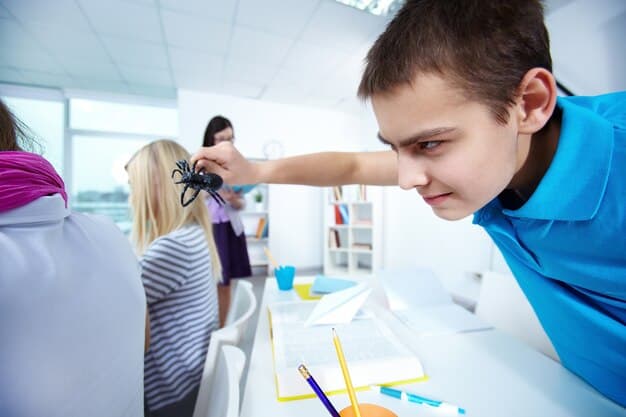If you receive a referral in school, it usually means that you have been referred to a teacher or administrator because of a behavioral issue or academic concern.
We will discuss what could happen if a student receives a referral at school, what might happen after a disciplinary action, and advice on how to cope and grow from the experience. By being informed and prepared, students can effectively manage the repercussions of a referral and take proactive steps to prevent future issues.
What Is a School Referrals?
A referral is a notice or recommendation given to a student when they exhibit behavior or academic issues that require attention. School referrals can be divided into two main types: behavior referrals and academic referrals.
Behavior referrals focus on actions that disrupt the learning environment or violate school policies. These can include instances of bullying, physical aggression, defiance, or chronic disruptive behavior. When a behavior referral is issued, it means the student’s actions need to be addressed by teachers, administrators, and possibly even parents.
Academic referrals, on the other hand, revolve around a student’s academic performance. This type of referral may be given when a student consistently struggles with coursework, fails to complete assignments, or demonstrates significant difficulty grasping the material.
Academic referrals aim to identify the specific areas in which a student requires additional support or resources to catch up and succeed academically.
Reasons for Receiving a Referral
There are various reasons why a student may receive a referral in school. These include:
- Behavior Issues: Students may be referred when they engage in disruptive or inappropriate behavior that hinders their own learning or that of their peers. This can include actions such as talking back to teachers, being consistently late to class, or engaging in disrespectful behavior towards others.
- Academic Struggles: Referrals may be issued when students consistently perform below grade level or fail to meet academic expectations. This could indicate a need for extra academic support, such as tutoring or modified assignments.
- Violation of School Policies: Referrals may also be given when students breach school policies, such as using prohibited substances, cheating on exams, or engaging in bullying or harassment.
- Attendance Issues: Chronic truancy or excessive tardiness may result in a referral. Students who miss significant amounts of school are at risk of falling behind their peers and may require interventions to address this issue.
- Emotional or Mental Health Concerns: Referrals may be made if teachers or administrators notice signs of emotional or mental health difficulties. These could include symptoms such as overwhelming anxiety, frequent mood swings, or an ongoing sense of sadness or despair.
Read Also: How to Talk To Parents as a Teacher to Improve Teacher and Parents’ Communication
The Role of Teachers and Administrators in Issuing Referrals
Teachers and administrators play a vital role in issuing referrals. They are responsible for identifying problematic behaviors or academic gaps and determining if a referral is necessary.
These education professionals have a duty to ensure a safe and effective learning environment for all students. Teachers typically document specific incidents or patterns of behavior in a referral form, outlining the details and the impact on the student’s education.
Administrators then review the referral, assess the severity of the issue, and determine appropriate interventions or consequences. By issuing referrals, educators aim to address the underlying causes of these behaviors or academic struggles and provide students with the necessary support to overcome challenges and succeed in school.
Consequences Of School Referrals
Getting a referral in school can have serious consequences. These can include disciplinary actions, such as detention or suspension, and potential long-term effects on your academic progress and reputation. It’s important to understand the implications and address the underlying issues to avoid further negative outcomes.
Academic Consequences
When a student receives a referral in school, it can have significant academic consequences. Firstly, referrals often result in missed class time, as students are usually required to attend meetings with school administrators or teachers to discuss their behavior. This absence from class can lead to missed assignments, incomplete notes, and falling behind in coursework.
Moreover, referrals often come with additional punishments that directly impact a student’s academic performance. Students may receive detentions, suspensions, or even be expelled depending on the severity of the offense. These disciplinary actions can disrupt the learning process and hinder a student’s ability to focus and succeed academically.
Social And Emotional Consequences
In addition to the academic impact, referrals can have negative social and emotional consequences for students. When a student receives a referral, it often becomes known among their peers, potentially leading to social stigma, embarrassment, and a damaged reputation. These social repercussions can cause feelings of isolation, low self-esteem, and even bullying.
Furthermore, referrals can also take a toll on a student’s emotional well-being. The experience of being disciplined can cause stress, anxiety, and frustration. Students may feel unfairly treated or misunderstood by teachers and administrators, leading to feelings of resentment and negativity towards the school environment.
Long-term Effects On Students’ Educational Journey
The consequences of school referrals can extend beyond the immediate academic and social impact, affecting a student’s long-term educational journey. Continued misbehavior and referrals can create a pattern that follows a student throughout their school years, potentially leading to a tarnished disciplinary record.
This record can have implications for a student’s future educational opportunities and prospects. Colleges, universities, and employers often inquire about disciplinary records, and a history of referrals can negatively influence admission or employment decisions.
Additionally, repeated referrals may necessitate additional interventions and special supports, diverting resources and attention away from other students in need.
Ultimately, when a student receives a referral in school, the consequences can be far-reaching. From academic setbacks and social challenges to long-term effects on educational prospects, it is crucial for students to understand the importance of making positive choices to avoid such consequences.
Check Also: How to Resolve Conflict between Teachers And Parents
Addressing And Preventing School Referrals
Addressing and Preventing School Referrals is an essential aspect of creating a supportive and inclusive learning environment. When students receive referrals, it indicates that their behavior or academic performance has raised concerns. It is crucial for schools to implement effective strategies, alternative disciplinary measures, and foster collaboration between schools and families to address and prevent school referrals.
Strategies For Intervention And Support
Implementing effective strategies for intervention and support can help address the root causes of referrals and promote positive behavior. Here are some strategies schools can consider:
- Identify and address underlying issues: Understand the reasons behind a student’s behavior or academic struggles and provide targeted interventions.
- Educate and empower teachers: Provide professional development opportunities to teachers to enhance their skills in behavior management and academic support.
- Implement a positive behavior support system: Establish clear expectations and positive reinforcement systems to encourage appropriate behavior and academic progress.
- Offer counseling and mental health services: Provide access to counseling services to address emotional, behavioral, and mental health needs of students.
Alternative Disciplinary Measures
While referrals might be necessary in certain circumstances, schools can also consider employing alternative disciplinary measures to address behavior concerns. Some alternatives include:
- In-school suspension: Assigning students to a designated area within the school premises, allowing them to reflect on their actions while continuing their academic work.
- Restorative justice practices: Encouraging students to take responsibility for their actions, make amends, and restore relationships impacted by their behavior.
- Peer mediation programs: Involving trained student mediators to help resolve conflicts between peers.
- Behavior contracts: Establishing specific goals and consequences in collaboration with the student to promote positive behavior.
Importance Of Collaboration Between Schools And Families
Collaboration between schools and families is vital in preventing and addressing school referrals. When schools and families work together, they can provide comprehensive support and intervention. Consider the following:
- Regular communication: Establish open lines of communication to exchange information regarding a student’s progress or challenges.
- Create a support network: Engage families in school programs and initiatives, such as parent-teacher associations and support groups.
- Establish individualized plans: Collaboratively develop personalized plans to address specific needs and challenges faced by students.
- Involve families in decision-making: Seek input from families when determining appropriate interventions and disciplinary measures.
Conclusion
Getting a referral in school can have a significant impact on a student’s academic journey. It serves as a wake-up call, prompting students to reflect on their actions and make necessary changes. Whether it’s for disciplinary or academic reasons, referrals can provide an opportunity for growth and learning.
Students can work to improve and eventually succeed in their academic efforts by comprehending the reasons for the referral and taking proactive steps to address the underlying difficulties. Embracing this experience can lead to personal development and a brighter future.




